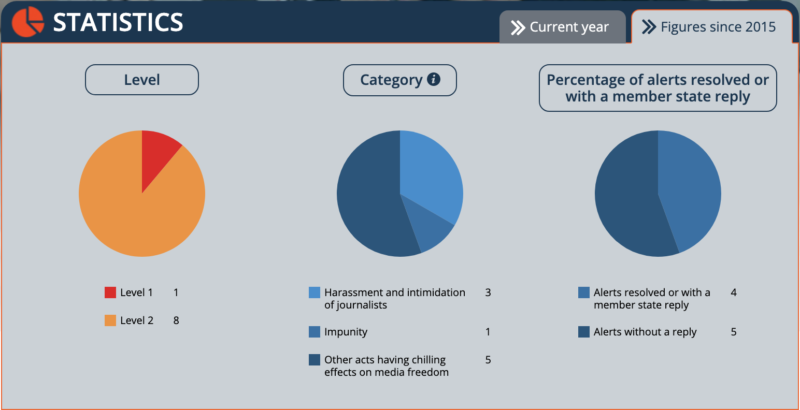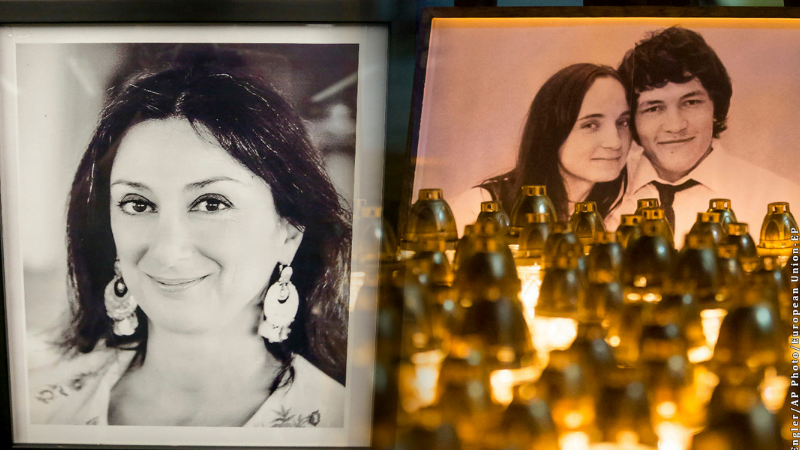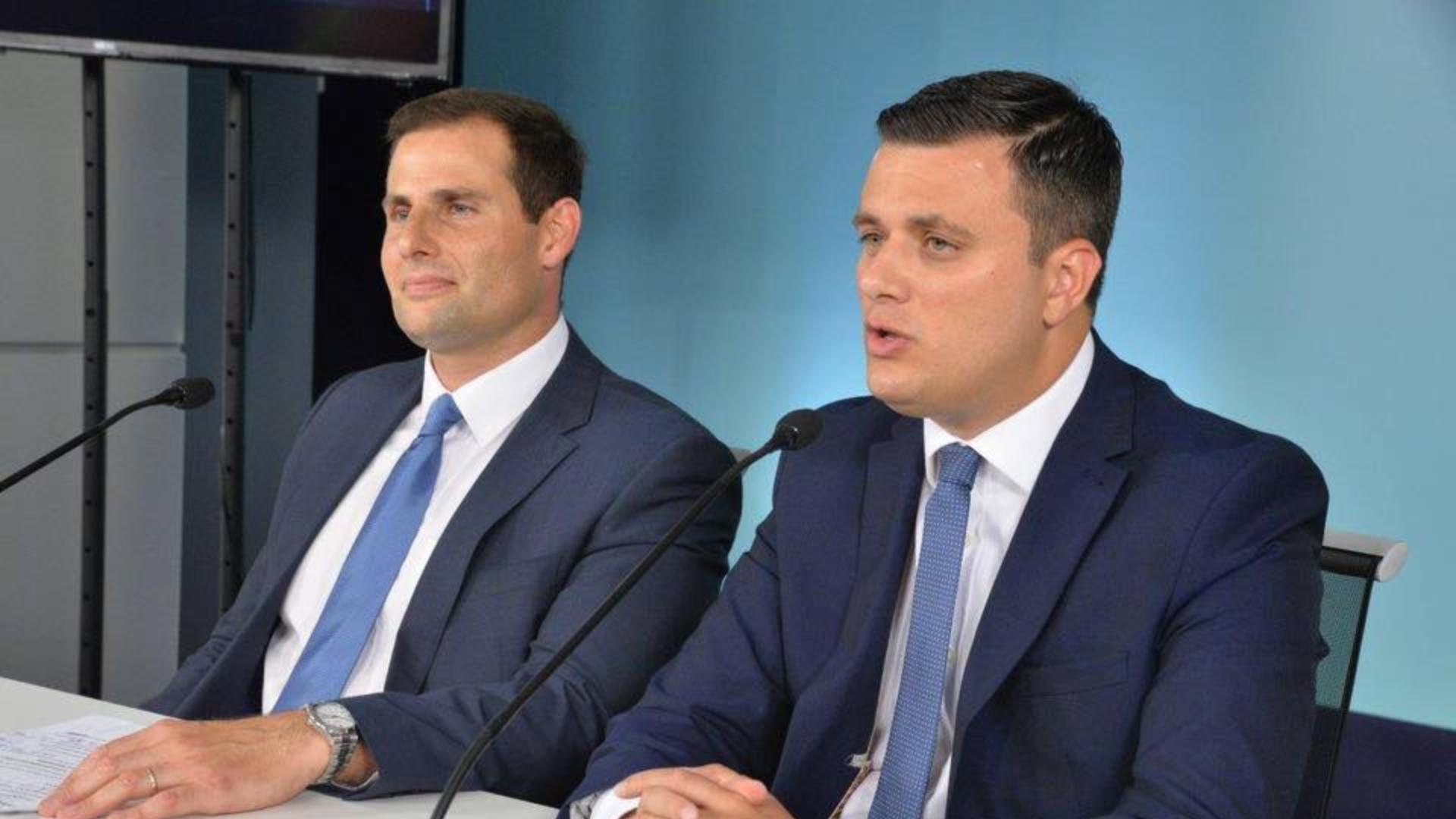Malta has a total of nine alerts on the Council of Europe’s platform to promote the protection of journalism and safety of journalists, only one of which is marked as “resolved” and another of which is marked as a case of “impunity for murder,” according to its annual report.
As the world marks Press Freedom Day, the report, written up by a coalition of press freedom NGOs, journalists federations and media alliances, found that “in 2020, extraordinary damage was inflicted on the practice of free and independent journalism” as a result of COVID-19 emergency regulations as well as an entrenching of the culture of impunity; increased threats and physical violence; judicial harassment and State-led media capture as methods to undermine independent journalism.
In 2020, the online platform published 201 media freedom alerts overall, marking a 40% increase from 2019. The Shift highlights the incidents in Malta that are currently featured on the platform since its launch in 2015.
2017 – Starting badly
The first alert was registered in February 2017 when journalist Daphne Caruana Galizia had her bank accounts frozen with precautionary warrants for €47,460 after a court upheld a request by former economy minister Chris Cardona and his consultant Joe Gerada to issue garnishee orders alongside four libel suits they had filed against her.
The State replied to the alert via a letter of the Permanent Representation of Malta to the Council of Europe arguing that the garnishee orders complained about were not issued by the government but by Cardona and Gerada in their personal capacity and, therefore, disagreed with the source of the threat being labelled as “the State”.
The source of the threat has remained unchanged on the platform.
The second alert was Caruana Galizia’s assassination on 16 October 2017 – an alert which in October 2019, was transferred by the partner organisations to the category of ‘impunity for murder’, based on their assessment of the lack of sufficient progress in the investigation of this case. The only State reply registered on the platform is a press release by disgraced former prime minister Joseph Muscat following the assassination.
2018 – The only year a threat is ‘resolved’
In 2018, the platform registered how in an official letter to the Times of Malta, the Malta Financial Services Authority (MFSA) requested that the newsroom disclose “the source/s of the information contained” in a report on the planned takeover of the Manoel Island project.
In response to the alert, the MFSA withdrew its request a month later. This was communicated to the platform by another letter of the Permanent Representation of Malta to the Council of Europe and the incident was then marked as “resolved”.
2019 – Persistent chilling tactics
Three attacks registered as having a chilling effect on media freedom were logged in 2019. The first was the cyber attack in January of that year on The Shift’s news portal that was aimed at taking the site down, following the publication of a series of investigative stories on the controversial Vitals hospitals deal.
The second alert was registered in October when journalists Carlo Bonini, John Sweeney, and Manuel Delia received a letter from a private London-based law firm on behalf “of the government of Malta in connection to the authors’ communication on 2 September to the prime minister, his wife, and three government ministers”. The letter was sent to fend off questions the authors had sent to a number of government officials in relation to their book.
No State replies have been logged for either of these incidents.
The third incident took place in November when following a press conference called by Joseph Muscat where he announced he would stay in the job until the investigation into the murder of Caruana Galizia was complete, journalists were barred from exiting the Ambassadors’ Room at the Office of the Prime Minister after the press conference.
They were denied exit, allowing for Muscat and the Cabinet to leave the building without having to answer any additional question from journalists. In December 2019, the Maltese government’s reply to the alert stated that it was, “absolutely untrue that journalists were locked in the Office of the Prime Minister”.
A complaint about the incident was also filed by the Institute of Maltese Journalists (IGM) to the Commissioner for Standards in Public Life who concluded that there was a prima facie breach of the ethics code.
A court ruling on the case let the three men accused, Jody Pisani, Mark Gauci and Emanuel McKay, off the hook. Not because they hadn’t committed the crime but because the police investigation was so thoroughly deficient that the Magistrate had no other option.
“The court would like to make it absolutely clear from the start that it is not at all pleased with the way the investigation was conducted,” Magistrate Joseph Mifsud said. In his detailed 46-page judgement, the magistrate drew up a long list of banal deficiencies committed by the prosecution.

Alerts for Malta to the Council of Europe’s Platform to promote the protection of journalism and safety of journalists. Source: Council of Europe
2020 – An increase in legal threats
Three threats were registered in 2020. The first was the demand by Kristijan Curavić, the executive director of the NGO Ocean Alliance, that The Shift deposits €300,000 into a bank account in compensation for damages he claims to have suffered as a result of The Shift exposing his ‘environmental’ White Flag scam.
Then came the legal letters between May and June 2020 from the US-based law firm Lambert Worldwide and UK-based law firm Atkins Thomson to Times of Malta, MaltaToday, Malta Independent, Lovin Malta and The Shift News in relation to their reporting and journalistic inquiries on a wind farm deal in Montenegro and alleged connections between British-Azerbaijani entrepreneur Turab Musayev and Maltese business owner Yorgen Fenech, who is charged with complicity in the murder of journalist Daphne Caruana Galizia.
The third alert was registered in November 2020 a member of the legal team defending businessman Yorgen Fenech, allegedly attempted to hand over a wad of cash to Times of Malta journalist Ivan Martin at the end of a meeting.
The sources of all three alerts have been classified as “non-state” but all remain, to date, unresolved.
More voices, more often
The number of unresolved incidents underscores the concern that many press freedom organisations continue to have about the trends unfolding in Malta.
It is also reflected in the press release to mark World Press Freedom Day, by the Institute of Maltese Journalists (IĠM) who called for “a concerted effort for journalists to be shown more respect in their line of work.”
The newly founded PEN Malta has also published a statement where it “underlines the need for the Maltese government to stop suppressing information to the media and to eradicate all obstacles for independent news organisations, many of which are financially crippled because of the pandemic.” And also called on “the Maltese authorities to ensure full justice for all those involved in Daphne Caruana Galizia’s murder and further calls on the authorities to act on the findings of the public inquiry once concluded.”
A statement by PN spokesperson for Human Rights and Good Governance Therese Comodini Cachia also acknowledged how journalists are threatened by a culture that does not attribute value to their important role in Maltese democracy.














The more I think of it, and the more I read her writings, the more in awe I am and always shall be of Daphne. Yes, sometimes a bitter pill to swallow, but remedies are sometimes so.
A true hero.